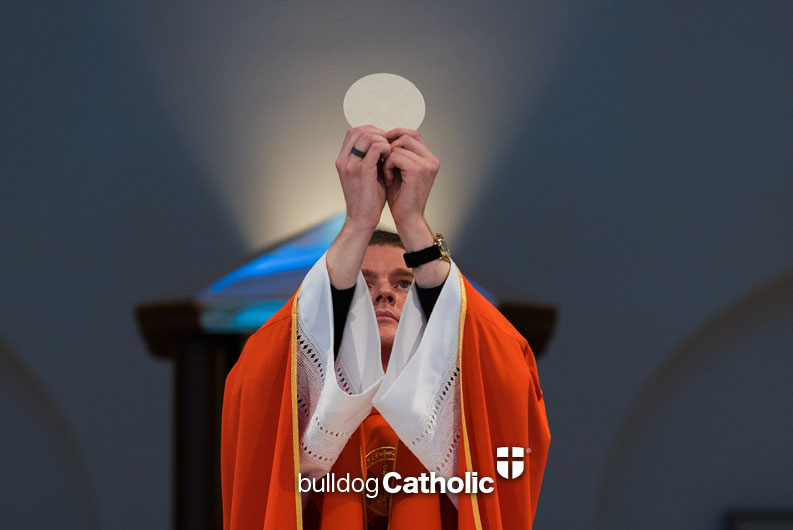
Non-Catholics Receiving the Eucharist
Q: My non-Catholic friend comes with me to Mass, but she insists on receiving the Eucharist. Is that okay?
A: So, I have to encourage you for inviting your friend to Mass. That is exactly what we should be doing as Catholics in the first place. It is extremely important that we are quick to invite our friends and family to Church, and are committed to hospitality.
That being said, it is very “not okay” that your friend is receiving Holy Communion. That isn’t anything against hospitality (I’ll get back to that), but is simply the fact of the matter. We may not extend the offer of Communion to all those who are not Catholic or are not practicing Catholics. You may have even heard a priest invite everyone to receive, but he doesn’t have the right to do that. Here’s why: The Eucharist is more than a symbol and “Communion” really means something.
Back in the day (around the year 140 AD), a man named Justin was asked to describe how Christians worshipped…what they did when they got together every Sunday. He made it very clear:
“And this food is called among us Eucharist, of which no one is allowed to partake but the man who believes that the things which we teach are true, and who has been washed with the washing that is for the remission of sins, and unto regeneration, and who is so living as Christ has enjoined. For not as common bread and common drink do we receive these…but…likewise have we been taught that the food which is blessed by the prayer of His word…is the flesh and blood of that Jesus who was made flesh.”
Since the beginning of Christianity, every believer recognized that the Eucharist is truly the Body and Blood, Soul and Divinity of Jesus Christ.
Since the beginning of Christianity, every believer recognized that the Eucharist is truly the Body and Blood, Soul and Divinity of Jesus Christ. Because of this, they consistently recognized that this holy thing (really, the holiest of things!) was only available to those who were part of the Church. We can see why the Church would teach this: the Eucharist is not “common bread and wine”, but the “flesh and blood of…Jesus”. If it is simply a symbol, then do whatever you want with it. But if it is Christ, we may not do whatever we want with it. (See John 6:34-69 and 1 Cor. 11:23-30.)
Am I saying “non-Catholics are bad and don’t deserve the Eucharist”? Absolutely not. They have “been washed” in Baptism. They are truly our brothers and sisters. But they do not “believe that the things we teach are true”, and so we find ourselves separated. That isn’t an insult, it is a description of what denominations are.
“Jesus wouldn’t turn them away!” Correct. Neither does the Church. If a person wants to receive the Eucharist, they need do nothing more than become Catholic. “Communion” really means something. It doesn’t just mean “I’m in union with Jesus”; it means “I’m in union with the Catholic Church”. Did you realize that every time you come forward to receive the Eucharist and say “Amen” you are not merely saying, “I believe that this is the Body of Christ”. You are saying what every convert to the Catholic Faith says at the Easter Vigil Mass: “I believe and profess all that the Catholic Church teaches, believes and professes to be revealed by God.” That’s what your “Amen” means. It means you are in Communion with the Pope, the bishops, and all the Faithful throughout time and eternity.
Last thing. Someone may say, “Oh real nice hospitality! I can’t believe you would invite me to church and then say I can’t go up and get that wafer!” They may even insist on taking the Eucharist. This is not only sacrilege, it is incredibly rude. It is way more than leaving your shoes on when your host asks you to take them off. It is more like saying: “I can’t believe you would invite me into your home, have me eat at your table, and now you’re telling me that I can’t sleep with your wife! You’re not being hospitable!” That may sound extreme, but you need to realize that for Catholics, this is the level of intimacy we are talking about.
We should be inviting our non-Catholic brothers and sisters to Mass. But I encourage you to be the one to instruct them about not receiving Communion. Above all things, we need to pray for the day when all those in Christ will be truly united around the altar of God.




